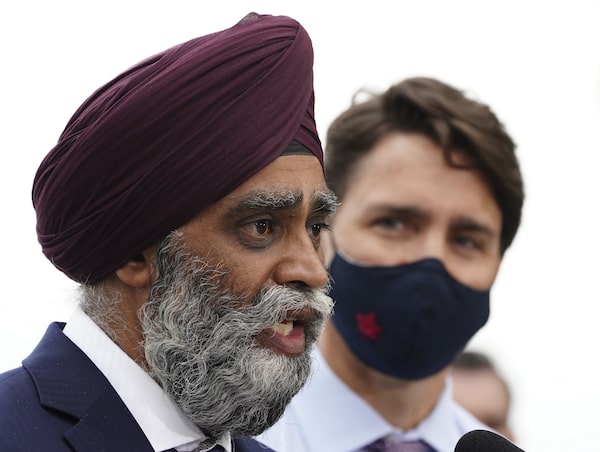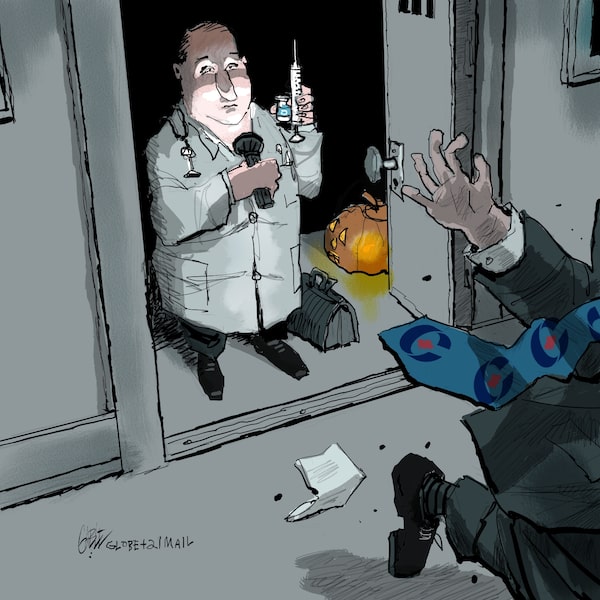Good morning,
Justin Trudeau will unveil a major overhaul of his cabinet today to address problem files like defence and deliver on key pledges on the environment and housing, while at the same time changing the senior staff in his own office.
Some of the Liberal government’s most high-profile ministers are expected to be on the move, with new leadership coming in the health, defence, and environment portfolios, sources say. Veteran Liberal MP Marc Garneau is expected to be moved out of the Global Affairs portfolio, according to the sources. Defence Minister Harjit Sajjan is expected to be given a new portfolio after six years in charge of the Canadian military.
- John Ibbitson: Garneau’s departure means Trudeau will have had five foreign affairs ministers in six years. That’s a travesty

Minister of National Defence Harjit Sajjan answers a reporter's question as he joins Liberal Leader Justin Trudeau for a campaign event in downtown Vancouver, B.C., on August 18, 2021. THE CANADIAN PRESS/Sean KilpatrickSean Kilpatrick/The Canadian Press
This is the daily Morning Update newsletter. If you’re reading this on the web, or it was forwarded to you from someone else, you can sign up for Morning Update and more than 20 other Globe newsletters on our newsletter signup page.
Edward Rogers’s lawyers ask company to back expedited court hearing amid OSC inquiries
Edward Rogers has received inquiries from Ontario’s securities watchdog amid uncertainty over the leadership of Rogers Communications Inc., according to a letter sent to the Toronto-based telecom yesterday by a lawyer representing him.
A dispute over which independent directors currently sit on the board of Canada’s largest wireless carrier has caused the company’s stock price to fall and triggered downgrades from analysts, says the letter, which urges the company to respond swiftly to a legal petition Edward Rogers plans to file in the B.C. Supreme Court today.
African leaders, hard-hit by climate change, plan a tougher stance at Glasgow negotiations
Gabon’s Environment Minister, Lee White, is readying an arsenal of arguments in favour of funding the next stage in Africa’s campaign to stave off the catastrophic effects of climate change.
Gabon, whose landmass is nearly 90 per cent covered in forests, making it the world’s second-most-forested country, is leading the African negotiating team at the United Nations climate summit that begins on Sunday in Glasgow, Scotland. Despite years of broken promises from Canada and the world’s other wealthy countries, White is ready to make his case for Africa again.
White will be a key player when negotiators begin their quest for a new global climate deal at the Glasgow summit, known as COP26. This time the negotiators will find it difficult to escape the growing discontent of leaders from Africa, the region where climate change is hitting hardest – and where the world’s promises have repeatedly gone unfulfilled.
- Greenhouse gas levels show planet veering from climate goal
- B.C. unveils latest plan to meet climate action targets, as emissions continue to climb
Got a news tip that you’d like us to look into? E-mail us at tips@globeandmail.com Need to share documents securely? Reach out via SecureDrop
ALSO ON OUR RADAR
Facebook failed to police abusive content, documents say: Facebook employees have warned for years that as the company raced to become a global service it was failing to police abusive content in countries where such speech was likely to cause the most harm, according to interviews with five former employees and internal company documents.
Gig economy the next target in Ontario labour-law changes: Ontario Labour Minister Monte McNaughton says his government will act within weeks to help the many freelance “gig workers” who deliver food or drive passengers from place to place – but won’t say if they will be granted the same rights and protections given to regular employees.
Cargo ship fire off of B.C. coast remains ‘dangerous and difficult’: The Canadian Coast Guard says the situation aboard a damaged vessel off the coast of Vancouver Island that’s carrying shipping containers of hazardous chemicals continues to be “dangerous and difficult,” with possible active fires inside some of the containers.
Chrétien criticized for comments on residential schools: Indigenous leaders and advocates criticized Jean Chrétien yesterday after the former prime minister said that, during his time as minister of Indian affairs, he was not aware of abuses that took place at residential schools.
Afghanistan’s population faces extreme hunger: More than half of Afghanistan’s population – 22.8 million people – will face extreme hunger over the winter months as the country plunges deeper into a worsening food crisis. A collapsing economy, drought and conflict have severely affected access to food in the country, United Nations agencies warn.
Military coup deals blow to Sudan’s democratic transition: A military coup in Sudan has dealt a sharp reversal to one of Africa’s most heralded and closely watched democratic transitions, igniting street protests by thousands of pro-democracy supporters and triggering a harsh crackdown that left scores of people dead or injured from military gunfire.
MORNING MARKETS
Shares made slim gains around the world this morning, with upbeat corporate earnings buoying European shares and outweighing recurring worries about China’s property sector.
The broad Euro STOXX 600 hit its highest in seven weeks, adding 0.5%, with German stocks gaining 0.9%.
After a stellar quarter for U.S. and British banks, Switzerland’s UBS rose over 2% on its highest quarterly profit since 2015, helping the financial services sector climb about 1%.
Wall Street futures were up 0.3%, with the earnings season reaching its peak and tech heavyweights including Apple Inc and Alphabet due to report later.
WHAT EVERYONE’S TALKING ABOUT
André Picard: “In Canada, 61 per cent of deaths occur in hospital. By comparison, that number sits at 30 per cent in the Netherlands, and 20 per cent in the United States. This is a gross systemic failure, and a tremendous waste of money.”
Cathal Kelly: “In this job, falling in love with the people you cover is frowned upon, but you know how it goes with affairs of the heart. Sometimes you can’t help yourself. [Alex] Anthopoulos was one of those guys. Not a straight shooter, exactly .... But he’s someone who likes people, likes talking to them and doesn’t have a big-league bone in his body.”
TODAY’S EDITORIAL CARTOON

Brian GableBrian Gable/The Globe and Mail
LIVING BETTER
Whole grain? Whole wheat? What’s the healthiest bread?
No doubt you already know that whole grain bread is nutritionally superior to white bread. It has more fibre, protein, vitamin E, vitamin B6, magnesium and potassium. But the task of choosing between whole wheat, whole grain or pumpernickel, for example, isn’t as clear-cut. Is one more nutritious? How does sourdough bread rate? Here’s what to know to seek out a healthy loaf of bread.
MOMENT IN TIME: OCTOBER 26, 1999
Britain's Queen Elizabeth II with the Duke of Edinburgh outlines the Government's program for the forthcoming Parliamentary session from the Throne in the House of Lords in London Wednesday, Nov. 17, 1999.MICHAEL STEPHANS/WPA POOL via AP
House of Lords votes to end hereditary voting right
When Britain’s House of Lords voted to end the right of hereditary peers to sit in the chamber, there were cries of “treason.” “What we are witnessing is the abolition of Britain,” Charles Beauclerk, the Earl of Burford, shouted as voting took place on Oct. 26, 1999. Getting rid of the 750 or so dukes, marquesses, earls, viscounts and barons who sat in the House of Lords by right of birth had been a priority of then-prime minister Tony Blair since his Labour Party won a landslide victory in 1997. The reform-minded prime minister viewed the peers as anachronisms. But making the change wasn’t easy. In the end, Blair had to strike a compromise and agree to keep 92 hereditary peers until further reforms to the Lords took place. Those reforms never happened and the 92 peers continue to sit among the 700 other Lords who have been appointed for life by various prime ministers. Whenever a hereditary peer dies or retires, the remainder elects a replacement from a pool of title holders. So in a way, they’ve become more democratic than the rest of the chamber. Paul Waldie
Read today's horoscopes. Enjoy today's puzzles.
If you’d like to receive this newsletter by e-mail every weekday morning, go here to sign up. If you have any feedback, send us a note.